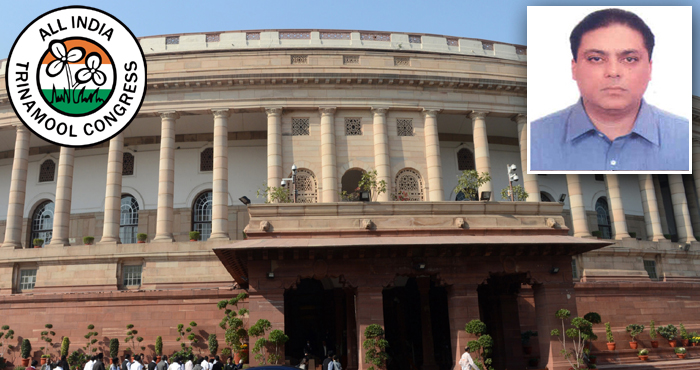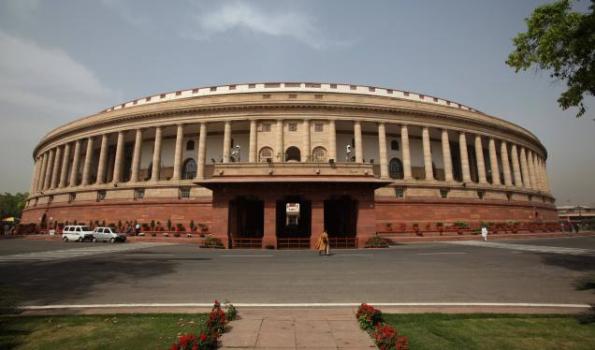Trinamool Congress raised various issues in both the Houses of the Parliament during the week and urged the Government to take appropriate steps.
In the Upper House, the Trinamool Congress utilised the Zero Hour, the Question Hour, the Calling Attention Motions to the fullest and took part in several discussions.
Question Hour
Trinamool Leader of the Parliamentary Party in Rajya Sabha Derek O’Brien urged Centre to set up a committee to address concerns of debt-stressed States during Question Hour (http://goo.gl/3fds2m). Later in the week he again the Government what steps it was taking to make medicines affordable prices, and ensure that prices are not affected by FDI (http://goo.gl/q1rvwx)
MP KD Singh also questioned the Government on allowing of taxis in private airports (http://goo.gl/4G8Qsr).
Saugata Roy questioned the Centre on its stand on small tea gardens during Question Hour in LS (http://goo.gl/tTWlJN) and also the shift of Tea Board HQ from Kolkata to Assam (http://goo.gl/ljJOm2).
Ratna De Nag raised a question in LS regarding the mechanism of preventing banned drugs from being sold in the country (http://goo.gl/TPE8tn).
Prasun Banerjee’s question to the Central Government was on popularising football in India by strengthening the federation (http://goo.gl/4sHqmB).
Mumtaz Sanghamita, during Question Hour in Lok Sabha raised the issue of investment in development of airport/airstrips and also questioned the government on the withdrawal of the Air India flight from Durgapur where it is much needed (http://goo.gl/PMCrGU).
Zero Hour
MP Dola Sen, during the Zero Hour spoke regarding the demand for elimination of unmanned level crossings in the country (http://goo.gl/UPOHjq).
Sukhendu Sekhar Roy raised the issue of scholarships for minority students being during Zero Hour (http://goo.gl/cGA8gL) and Ratna De Nag raised the demand of expanding the subway at Bhadreswar station (http://goo.gl/xOmMDM).
Aparupa Poddar demanded allocation of funds for pilgrimage to Tarakeswar during Zero Hour and also introduction of special trains during the annual pilgrimage to Tarakeswar (http://goo.gl/lYvQqf). Whereas Pratima Mandal spoke on the need of a level crossing at Piyali railway station to ensure easier movement of vehicles and students across the Piyali River (http://goo.gl/8JDnDd).
Nadimul Haque in the week, during Zero Hour he raised the demand for release of scholarships to minority students (http://goo.gl/STr8ID) later in the week.
Special mention
Trinamool MP Md Nadimul Haque during a Special Mention urged the Government on the need for a law against spitting in public places (http://goo.gl/92m0FN).
Trinamool MP Ahamed Hassan Imran, during a Special Mention raised the issue of reduced Central funding of schemes (http://goo.gl/Gfbxf4) which is against the spirit of cooperative federalism. He later spoke on drug pricing during a Calling Attention Motion.
In a Special Mention Dola Sen spoke on the need to replicate successful models in combating Left Wing Extremism (http://goo.gl/2UEbM6).
Discussion
During a Short Duration Discussion on the situation arising out of the rise in prices in the country (http://goo.gl/k9nsWa), Derek O’Brien pointed out that Government is very good at communicating on social media sites. But when it comes to basic issues like price rise, they have forgotten the people that gave them this historic mandate in 2014 people that brought them to power.
The Trinamool Leader of the Party in Rajya Sabha also raised the issue of Aadhaar card being made mandatory for receiving Government benefits and pointed out that there are a lot of people who are suffering and not getting pension and several other benefits (http://goo.gl/VqpX6e).
Trinamool Chief Whip at Rajya Sabha, Sukhendu Sekhar Roy took part in a short duration discussion on Andhra Pradesh Reorganization Act, 2014 (http://goo.gl/cB9KIs) where he demanded that assurances made by the then Prime Minister on the floor of the House must be fulfilled.
In Lok Sabha, the Trinamool Congress Trinamool Chief Whip Kalyan Banerjee took part in several discussions including The Child Labour (Prohibition and Regulation) Amendment Bill, 2016 (http://goo.gl/OTGrfx), on The Lokpal and Lokayuktas (Amendment) Bill (http://goo.gl/HZpoba), on The Benami Transactions (Prohibition) Amendment Bill, 2015 (http://goo.gl/9d7qHI) and protested the issue of Aadhaar card being made mandatory, during a short discussion (http://goo.gl/ThrEhX).
Trinamool MP Dr Sugata Bose took part in several discussion including the Lokpal and Lokayuktas (Amendment) Bill (http://goo.gl/iugFHh).
Sugata Bose, while speaking in LS regarding an enabling regulatory architecture in higher education institutions stated that Jadavpur University from West Bengal is in the 500-600 range of the world rankings of the TIME’s higher education supplement. On the subject of education (http://goo.gl/1nz5Df) Saugata Roy also spoke in Lok Sabha on The Institutes of Technology (Amendment) Bill, 2016 and stated that IIT Kharagpur was a pioneer in the field and for the first time it started courses in naval architecture. Aeronautical engineering and agricultural engineering which were not taught anywhere else in the country (http://goo.gl/ENKkWp).
Saugata Roy raised the issue of Chinese incursion in Uttarakhand (http://goo.gl/4w9Lau). While speaking on The Benami Transaction (Prohibition) Amendment Bill, 2015 Saugata Roy mentioned that the Bill should not become another cursive instrument in the hands of revenue department to forcibly collect taxes (http://goo.gl/QZj9NP).
During a discussion on price rise in Lok Sabha, Saugata Roy criticized the central government stating their motto seems to be imposing cess on everything under the Sun (http://goo.gl/k9ITy5).
Ratna De Nag spoke on The Child Labour (Prohibition and Regulation) Amendment Bill, 2016 during which she stated that even after 69 years of independence; we are unable to stop child labour in our country (http://goo.gl/HDsRVU) whereas Aparupa Poddar mentioned that child labour is a highly social evil and the root cause of child labour is poverty (http://goo.gl/l5xuvV).
Nadimul Haque took part on a discussion on The Compensatory Afforestation Fund Bill, 2016, and stressed on the Trinamool Congress’ view on the ‘Rights of the Forest’ (http://goo.gl/uuhZGP)




